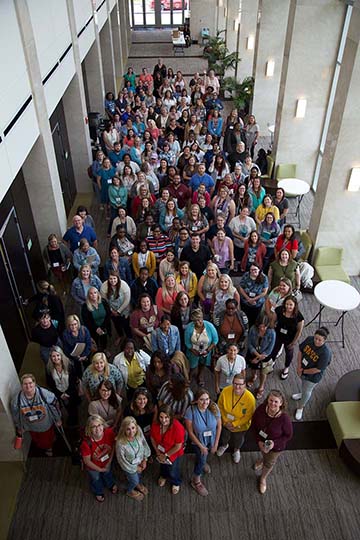MSU prepares more than 550 elementary teachers to implement computer science curriculum

More than 550 elementary school teachers participated in four sessions this summer in the Elementary Computer Science Summer Institute, hosted by Mississippi State’s Center for Cyber Education as part of a statewide effort to implement K-12 computer science curricula.
After completing training led by Mississippi State University this summer, more than 550 elementary teachers across Mississippi are beginning the new school year equipped to implement computer science concepts in core subjects.
MSU’s Center for Cyber Education recently hosted its Elementary Computer Science Summer Institute in four locations this summer, with 572 public school teachers participating in the two-day training. The educator training is helping school districts meet the requirements of state legislation passed in 2021 that requires them to provide computer science instruction at each grade level by 2024-25. Teachers learned how to integrate computer science into English language arts, math, science and social studies lessons.
Center for Cyber Education Director Shelly Hollis said the training included hands-on activities with robots, a full day of coding instruction, and a guide with lessons for every grade level that are in line with Mississippi College and Career Readiness curriculum standards. She added that reaching students at the elementary level is a key part of getting students interested in computer science as a school subject and as a career field.
“Studies show that students make up their mind about what they are ‘good at’ by middle school,” Hollis explained. “If they haven’t had consistent, positive exposure to computer science during their elementary years, they may feel like they don’t belong in that space and are less likely to show interest in computing topics during middle school and beyond, making it much harder to recruit students into computer science fields. This is particularly true for females, who represent 25% or less of the computing workforce. Preparing educators to teach computer science at the elementary level will help grow our workforce and make it more diverse.”
According to code.org, there are currently more than 500,000 computing jobs across the country, including more than 3,000 in Mississippi. The Mississippi Computer Science and Cyber Education Equality Act, passed by the Mississippi Legislature and signed into law by Gov. Tate Reeves, requires the Mississippi Department of Education to implement a mandatory K-12 computer science curriculum that includes instruction in areas such as computational thinking, cybersecurity, data science, robotics and more. The bill included $1 million in state funding for computer science education, which was matched by $1 million in private funding from C Spire.
MSU has been working with the Mississippi Department of Education for several years to develop computer science curricula. These efforts, led initially by the university’s Research and Curriculum Unit and later the Center for Cyber Education, included a successful pilot educator training program through Computer Science for Mississippi. In 2019, MSU’s College of Education began offering computer science endorsements for future educators.
As part of the legislation passed last year, the Center for Cyber Education is continuing its work with the state to develop computer science curricula and delivery options, as well as teacher training. This summer’s training took place in Tupelo, Cleveland, Flowood and Gulfport, with each participating school district sending six teachers that could then return to their schools and train other teachers, encouraging participants to “be a champion” for computer science for their peers and their students, Hollis said.
MSU is Mississippi’s leading university, available online at www.msstate.edu.
James Carskadon | Public Affairs



